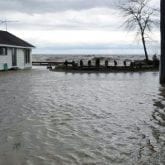Put your money in Conservation Authority Flood Management Programs and it will be well-spent – May 10, 2017 Credit Valley Conservation post
Updates
A Nov. 18, 2016 Water Canada article is entitled: “Evaluating Long-Term Performance From Low Impact Development Practices.”
A July 12, 2017 CBC article is entitled: Don’t drain the swamp: report says wetlands help avert flood damage: Study says leaving wetlands in their natural state can help protect communities from severe flooding.”
[End]

The image is from the article, posted by Credit Valley Conservation, that is highlighted at the post you are now reading.
A May 10, 2017 Credit Valley Conservation article is entitled: “Put your money in Conservation Authority Flood Management Programs and it will be well-spent.”
The opening paragraphs of the article, by by Jo-Anne Rzadki, Business Development & Partnerships Coordinator, Conservation Ontario, read:
News of the unfortunate and fatal flood events in eastern Canada, Quebec, and Ontario has captured national media attention. There have been many cries for emergency relief and requests to all levels of government and the insurance industry to provide payments to repair damages. Recent media reports call for governments to take responsibility and make land use decisions that keep development, people and businesses, transportation and utility corridors safely away from floodplains in order to reduce costs and protect lives.
It’s good to see some of the heartwarming stories about tireless homeowners, emergency management officials and volunteers pitching in and helping with rescues and relief.
We think that Ontario’s network of Conservation Authorities is another good news story, but one that remains largely under the radar for most people, including our government partners. Generally, Conservation Authorities are not in the media, so many people don’t make the link between Conservation Authorities as a first line of defense in preventing and reducing the impacts of flooding, thereby also reducing the need for flood disaster assistance.
[End of excerpt]
A conflict of interest may be entailed, with regard to development on housing on flood plains
A May 9, 2017 CBC article is entitled: “One way to battle future flooding: stop building on flood plains, say experts: Goodale says building on land prone to flooding will be brought up with provincial counterparts at May meeting.”
The opening paragraphs read:
As the battle to protect homes from flooding continues across the country, questions are being asked about whether it’s time to reconsider regulations that allow developers to build on flood plains.
Jason Thistlethwaite, an assistant professor at the University of Waterloo’s faculty of environment, says the problem is that municipalities set zoning regulations and collect property tax revenue but do not pay for rebuilding costs after natural disasters.
“The municipality really doesn’t have an incentive to go in and use land-use planning and building codes and communications strategies to tell people that they are at risk of flooding, particularly given that most of the revenue comes from development, it comes from property taxes.” Thistlethwaite said. “So they face a real conflict of interest.
“Poor land-use planning at the local level basically goes unpunished and in fact gets rewarded with additional disaster assistance from the province, from the federal government.”
[End of excerpt]
Kelowna
A May 11, 2017 CBC article is entitled: “Kelowna mayor warns residents to prepare for unprecedented flooding tonight: ‘As a community, we need to come together and look after each other,’ mayor says.”
Prince Edward Island
A previous post is entitled:
Coastal erosion due to sea level rise in Prince Edward Island is highlighted at these links
Physiography of Southern Ontario (1984)
The Physiography of Southern Ontario (1984), one of my favourite books about physical geography, is written in a characteristically friendly, crisp, and authoritative form of language. The book features a remark about flood plains that I find apt and evocative. The remarks is that (and I paraphrase): “The flood plain belongs to the river that runs through it; it stands to reason that people should avoid building houses on such a location.”
Toronto
An April 29, 2017 CBC article is entitled: “Toronto the resilient: how the city plans to adapt to climate change in 2050: City’s plans require dramatic shifts in lifestyle, planning and building, report says.”

Leave a Reply
Want to join the discussion?Feel free to contribute!